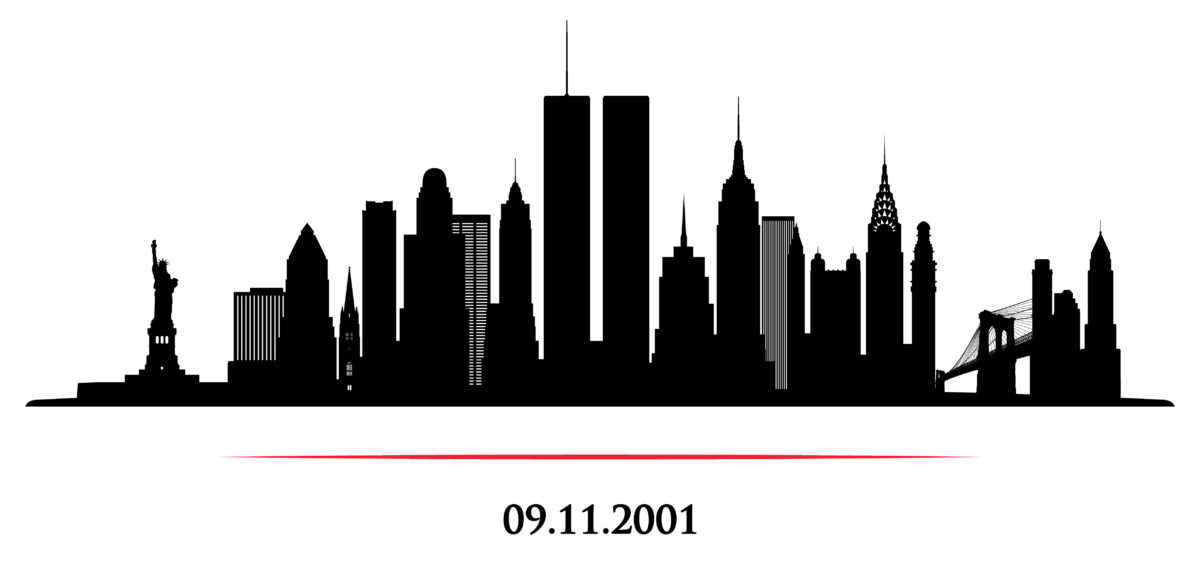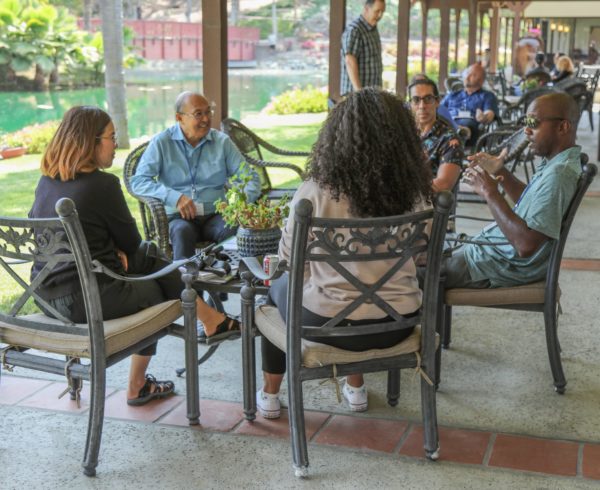I still remember that tragic Tuesday morning.
It was my second year in southern California as an undergrad student of Life Bible College in the Biblical Studies program. After parking my car, I walked toward my first class of the day (I lived off campus that year). The entrance doors to the building were locked. Posted up was a sign that read “all classes are cancelled” and a prayer meeting would begin shortly in our campus chapel. So I headed to the chapel.
As I entered, everything was quiet with students kneeling or sitting (some prostrate) on the floor in prayerful posture. A quiet somber atmosphere pervaded the room. Within a few minutes of quiet, our college president took the microphone and explained that the US had been under attack. I honestly don’t remember much of what he said after that; I simply recall that he urged us to pray. We must have been in that room praying for an hour or so as various teachers and students lead out in prayers and shared Bible verses.
It was all so surreal. It felt like something serious had just happened in our country but I didn’t quite know what to do with it. I remember thinking there was a chance we could even go to war.
It wasn’t until later that morning in my buddy’s dorm room that I would watch video footage of two planes crashing into the Twin Towers and eventually fall on themselves in a heap of rubble and destruction.
I don’t think I understood the gravity of that day and all that had transpired in New York City. Oddly enough, I remember being very concerned with my studies and getting back to my homework (I know it sounds heartless), so somehow I compartmentalized the prayer meeting and the Twin Towers and a potential war with another country, and got back to work.
Although 9/11 did have a real effect on me and would come up in conversations with others from time to time, it wouldn’t be for another ten years that I would take some concentrated time to truly reflect on the horrors of that day. I remember taking time out during my graduate studies to watch the footage all over again via YouTube, read old news reports and sit with the information. I was in a new space in my heart and mind at that time as I began paying attention to the world a bit more than I had ever done before.
The impact of 9/11 began gripping me in fresh ways as I entertained what had happened, the 2,977 dead and over 25,000 injured, President Bush’s “War on Terror,” the eventual Iraq and Afghanistan Wars and the killing of Osama Bin Laden. It was sobering to revisit what would become a national marker in American history for years to come.
Something also began to transpire in me. I had this deep-seated gut-wrenching sense that there was more to the 9/11 narrative than what was often spouted in the news or in church.
9/11 had exposed something.
It exposed some of our deepest fears surrounding safety, security and comfort. For many years, Americans had boasted of the best intelligence capabilities, military equipment and armed forces. And when 9/11 happened, it was abundantly clear that our best protective capabilities had cracks. So many of us felt threatened and unsafe.
The following weeks and months following that tragic Tuesday put us on high alert anticipating the possibility that other terrorists might be planning a next move. I remember airports being filled with armed soldiers. White people in particular (myself included) were suspicious of anyone who looked Middle Eastern unless they were already good friends or acquaintances. I suppose our actions were akin to the way Japanese Americans were treated after Pearl Harbor or Russian Americans were treated during the Cold War.
America had been involved in numerous military conflicts in the Middle East over the previous thirty years before 9/11 saying it was for the cause of freedom and democracy around the world. The problem with that version of patriotism is that both our increased military presence and our ongoing oil investments suggested otherwise. If Americans genuinely cared for the Middle East, who are a majority Muslim, then why was xenophobia toward Muslims, other Middle Easterners and those mistaken for Middle Eastern on the rise in the coming weeks and months following that tragic day in September?
So not only did 9/11 expose our fears about safety, but it also exposed some of our worst prejudices. Because while we would never say it aloud (and perhaps didn’t consciously realize our actions demonstrated this), we not only made terrorists the enemy; we perceived whole nations and individuals within those nations as enemies too.
You’ve probably heard people say things like, “Yeah, those people come from a terrorist nation. They got to be stopped.” Or how about “Their religion teaches them to hate Americans.” Perhaps we’ve said it ourselves.
The reality is this: coming from a particular nation does not automatically make a person a “terrorist” nor can we rightly call an entire nation terrorists. Even when leaders in political power of a particular nation are terrorists or support them, it doesn’t mean their entire nation is.
If our country today was judged for being tyrannical simply because our commander in chief acts in ways that resembles tyrants, we might not be in such good standing around the world either (indeed we currently aren’t unfortunately).
On the matter of religion, while some adherents to Islam may take on more violent and extremist interpretations, the religion as a whole does not teach Muslims to hate Americans. I have met many kind and peaceful Muslims over the years, and I’d venture to say they are in the majority and the extremists in the minority.
If we were to take the same harsh assessment that many people laid against Muslims post 9/11 and applied it to Christians and Christian church history, we would discover some shocking and abhorrent things. Christian individuals and those in political and religious power both in Europe and in the Americas have done awful and horrendous things in the name of Christianity…yes “terroristic” acts of violence on innocent human life that have nothing to do with Jesus or faith in him.
You get the point.
Making blanket statements about entire populations and nations negates the hard work of meaningful and ethical human engagement.
The US has all too often been into quick fixes. We have made attempts to force democracy on people around the world even if they were not ready for it or want it. And when that didn’t work, we attempted to control them. If that didn’t work…well you know the story.
I can’t help but think that 9/11 exposed something deeply off kilter in the American psyche: our lust for power and control at home and abroad is one of our greatest defects. Some suggest, idolatrous.
Pursuing justice for the 9/11 attacks could have been a noble effort. But what we meant by “justice” was often clouded by suspicions of imagined “enemies” near and far that primarily served to benefit our lust for power as a nation around the world.
Our so-called enemies (“those terrorists”) were more often scapegoats for actually dealing with our own issues as a nation. True justice pursues the actual hard work of humanizing others. True justice…equal justice…is the long hard work of advocating for those who have been sidelined, marginalized and forgotten. Even on behalf of foreigners who come here to build a better life for their family and loved ones. In other words, immigrants.
True justice takes time and diligence. True justice is not a quick fix.
The quick and easy path of xenophobia, of demonizing someone because of their country of origin, nationality, race or culture is not justice.
It’s injustice.
Maybe this year, 9/11 will call us forward. To dream of a better day.
Where all men and women, from America and from around the world, who are created equal, endowed by their Creator with certain unalienable human rights will strive toward equal justice where we treat our neighbors as we want to be treated.
Let me close with this story from the Gospel of Luke:
A very spiritual man who was an expert at quoting Bible passages once got Jesus’ attention and asked him what he should do to enter the way of life that Jesus taught about. Jesus responded that he should love God with his entire being, and then he said “Love your neighbor as you love yourself.” When the spiritual Bible expert asked Jesus who his neighbor was, Jesus told him a story about a certain man of a particular nationality and religion who was walking through his hometown one day. As he walked into town, he was stopped by some local thieves, beaten to a pulp and was left for dead. Later that day, a minister of the same nationality and religion as the man who had been beaten passed by him on the road and didn’t stop to help him. Some time after, still another minister of the same nationality and religion passed by him on the road and didn’t help him. That minister happened to be a deeply respected and well known leader in churches nationwide. It seemed no one was willing to stop and help the man who had been beaten and left for dead. Oddly enough, a foreigner from a different religion and culture saw the man who was beaten and lying on the ground. He stopped and had compassion on the man. He then stooped down and helped him up, bandaged his wounds and gave him medicine to help with the recovery. Since the man who had been beaten didn’t have anything on him to identify who he was and because he was unrecognizable, the foreigner from a different nationality and religion took the beaten man to a local hotel and paid for his stay.
Jesus stopped the story and looked at the spiritual man who was an expert at quoting the Bible and asked him, “Which of the three men in the story acted like this man’s neighbor?” The spiritual man responded, “The one who showed him compassion.” Jesus said, “Go and imitate this kind of life.”







